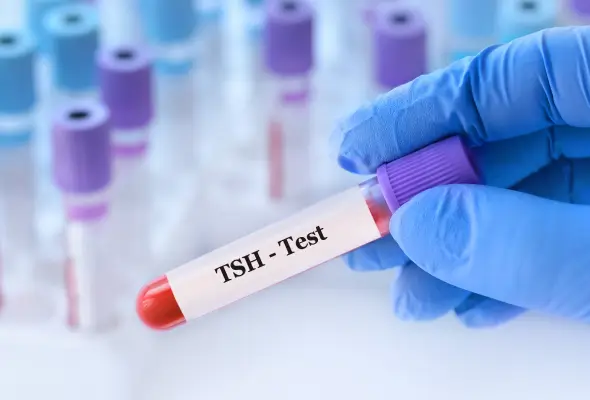-
Doctors
-
Specialities & Treatments
Centre of Excellence
Specialties
Treatments and Procedures
Hospitals & Directions HyderabadCARE Hospitals, Banjara Hills CARE Outpatient Centre, Banjara Hills CARE Hospitals, HITEC City CARE Hospitals, Nampally Gurunanak CARE Hospitals, Musheerabad CARE Hospitals Outpatient Centre, HITEC City CARE Hospitals, Malakpet
HyderabadCARE Hospitals, Banjara Hills CARE Outpatient Centre, Banjara Hills CARE Hospitals, HITEC City CARE Hospitals, Nampally Gurunanak CARE Hospitals, Musheerabad CARE Hospitals Outpatient Centre, HITEC City CARE Hospitals, Malakpet Raipur
Raipur
 Bhubaneswar
Bhubaneswar Visakhapatnam
Visakhapatnam
 Nagpur
Nagpur
 Indore
Indore
 Chh. Sambhajinagar
Chh. SambhajinagarClinics & Medical Centers
Book an AppointmentContact Us
Online Lab Reports
Book an Appointment
Consult Super-Specialist Doctors at CARE Hospitals

Thyroid Stimulating Hormone (TSH) Test
TSH (Thyroid Stimulating Hormone) test plays a crucial role in detecting and managing thyroid disorders. From understanding its purpose and preparation to interpreting results and addressing potential concerns, this guide provides valuable insights into the TSH test, ensuring you're well-informed about the process and its significance.

What is the TSH Test?
The TSH (Thyroid Stimulating Hormone) test is a blood test that measures the level of TSH in the bloodstream, helping assess the functioning of the thyroid gland. TSH is produced by the pituitary gland and regulates the production of thyroid hormones. Abnormal TSH levels can indicate thyroid disorders, such as hypothyroidism or hyperthyroidism.
Purpose of TSH Test
Here’s why a TSH test may be done:
- Assess Thyroid Function: This test helps determine if the thyroid gland is producing appropriate levels of hormones.
- Detecting Thyroid Disorders: This is done to identify conditions like hypothyroidism (underactive thyroid) or hyperthyroidism (overactive thyroid).
- Guides Medication Adjustments: This helps healthcare providers adjust thyroid medication dosages for optimal treatment.
- Monitors Thyroid Health: Regular TSH testing ensures ongoing thyroid health monitoring.
- Prevents Complications: Early detection of thyroid imbalances helps prevent complications and promotes overall well-being.
What Happens During the TSH Test?
Here’s what you can expect during a TSH test:
- Patient Preparation: Possible fasting or medication adjustments.
- Drawing Blood: A small sample is taken from a vein in the arm.
- Laboratory Analysis: TSH levels are measured in a lab.
- Result Interpretation: Normal levels suggest proper thyroid function. High levels indicate an underactive thyroid, and low levels suggest an overactive thyroid.
- Clinical assessment: Healthcare providers use results to evaluate thyroid health.
- Post-test: Minor bruising may occur; results guide potential treatment adjustments.
How Painful is the TSH Test?
TSH tests are generally painless, causing a brief pinch or sting during needle insertion. Discomfort is mild and short-lived, lasting only a few minutes. Post-test, minor bruising or soreness may occur. Overall, TSH tests are well-tolerated, with minimal and short-lived discomfort. Factors like the skill of the phlebotomist contribute to a smoother and less painful process.
How to Prepare for the TSH Test?
Here are some tips to prepare for a TSH test:
- Follow fasting instructions if provided.
- Adjust thyroid medications as advised.
- Discuss supplement and medication use.
- Wear accessible clothing for the blood draw.
What do TSH Test Results Mean?
- Low TSH Levels (Below Normal): If your TSH levels are lower than normal, they may be indicative of an overactive thyroid. The condition is known as hyperthyroidism. This means your thyroid is producing too much thyroid hormone. This condition may lead to symptoms, such as weight loss, anxiety, and a rapid heart rate. Your healthcare provider will likely recommend further tests to confirm the diagnosis and determine the appropriate course of treatment.
- High TSH Levels (Above Normal): On the other hand, elevated TSH levels suggest an underactive thyroid. This condition is referred to as hypothyroidism. In this case, your thyroid gland is not producing enough thyroid hormone. Symptoms may include fatigue, weight gain, and sensitivity to cold. Your healthcare provider will assess your thyroid function, potentially adjusting medication to bring TSH levels back within the normal range and alleviate symptoms. Regular monitoring and follow-up may be recommended to ensure effective management.
Conclusion
The TSH test is a cornerstone for thyroid health, offering simplicity in procedure and a profound impact on well-being. For personalised guidance or inquiries, consult an experienced doctor for more optimal thyroid treatment.
FAQs
1. What is a normal TSH level?
Ans: A normal TSH level typically falls within the range of 0.4 to 4.0 milli-international units per litre (mIU/L).
2. What happens if the TSH test is positive?
Ans: The TSH test doesn't give a "positive" result; instead, abnormal TSH levels can indicate either an underactive (high TSH) or overactive (low TSH) thyroid, prompting further investigation and appropriate treatment.
3. What happens if the TSH test is negative?
Ans: There is no "negative" or "positive" result for a TSH test; instead, the results are interpreted as within the normal range or abnormal based on established reference values.
4. What are some possible complications of the TSH test?
Ans: Complications of the TSH test are rare but may include minor bruising or infection at the site from where the blood was drawn.
5. How long does the TSH test take to perform?
Ans: The TSH test typically takes a few minutes to perform, including blood sample collection.
Still Have a Question?



